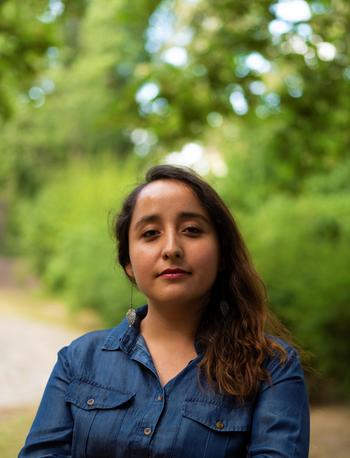Lorena López Jáuregui

International Research Training Group 'Temporalities of Future in Latin America'
History
PhD Project: "America and the People with History. The International Congress of Americanists and the effects of academic networking on science, museums, and temporalities, 1885-1915"
Education
|
05/2019 – 04/2022 |
PhD Candidate, International Research Training Group ‘Temporalities of Future’ |
|
2016 – 2019 |
Master of Arts in Interdisciplinary Latin American Studies, Freie Universität Berlin, |
|
2016 |
Certificate (diplomado) in History and anthropology of religions, Escuela Nacional de Antropología e Historia |
|
2011 – 2012 |
Exchange Student, Humboldt Universität zu Berlin, DGECI-UNAM Scholarship Holder |
|
2008 – 2013 |
Bachelor of Arts (Licenciatura) in History, Universidad Nacional Autónoma de México |
Work Experience
|
05/2019 – 04/2022 |
Researcher, International Research Training Group ‘Temporalities of Future’ |
|
2017 – 2019 |
Student Assistent, Prof. Dr. Stefan Rinke, Freie Universität Berlin |
|
2017 |
Research Assistant, Prof. Dr. Sven Beckert, Research Project: “Global History of Capitalism”, Harvard University |
|
2015 – 2016 |
Assistant Professor, “Porfirismo” Seminar of Prof. Mtro. Rubén Ruiz Guerra, Universidad Nacional Autónoma de México |
|
2013 |
Research Assistant, Prof. Dr. Federico Navarrete, Research Project “Historia y memoria de los pueblos indígenas de América”, Papiit Scholarshipholder, Universidad Nacional Autónoma de México |
|
2011 |
Voluntary Service, Museo Casa de Alfeñique, Project: “Divulgación del Museo Casa de Alfeñique”, Director: Patricia Vázquez Olvera |
PhD Project: "America and the People with History. The International Congress of Americanists and the effects of academic networking on science, museums, and temporalities, 1885–1915"
Supervisor: Prof. Dr. Stefan Rinke, Freie Universität Berlin
Since its first meeting in 1875 in Nancy, the International Congress of Americanists (ICA) has exhibited trends that allow us to understand the formation of international scientific communities and their adaptation to changing geopolitical contexts. This dissertation reconstructs a critical period in the history of this congress. It analyzes the dynamics of the ICA between 1885 and 1915, in parallel with the formation of science museums in Europe and the Americas. The Americanists of this period aimed to undertake large-scale interdisciplinary research specializing in the study of the indigenous populations of the Americas during different time periods.
By following the trail of their research and meetings, this thesis provides an intimate look at the people who made up the Americanist scientific community. It examines their encounters, agreements and disagreements, as well as their socioeconomic contexts, points of view and organizational hierarchies. By mapping its members, it surveys a network of researchers who contributed to the professionalization of archaeology and anthropology (among other disciplines) in an era that I call the Americanist Museum Era.
Drawing on the perspective of the history of science, this paper proposes we rethink the scope of ICA in its theoretical, methodological and social contributions. To this end, I contextualize their work on the systematization of knowledge of the Americas within and alongside the construction of the infrastructures that support it. These Americanist scholars developed new ways of understanding and representing the past, present and future through expeditions, excavations, and archives. They embedded their vision in publications and national narratives, archaeological sites and museum collections. Their collective work challenged the idea that America was a New World, deepening its conceptualization both as a unique entity and a continent worthy of study.
Keywords:
• Americanists
• Area Studies
• History of Science
• Museums
• Archaeology
• Anthropology
Articles
López Jáuregui, Lorena (2020). The Ancient Object and its Modern Negotiation. A History of Latin American Archeological Heritage in International Museum Networks of Collaboration and Competition (1894-1914). Intervención 2(22), 188-244.
López Jáuregui, Lorena (2020). Glosario de Pandemia. Una Cronología Covid-19 desde la Lengua Alemana. Cadernos do Tempo Presente 1(11), 35-45.


